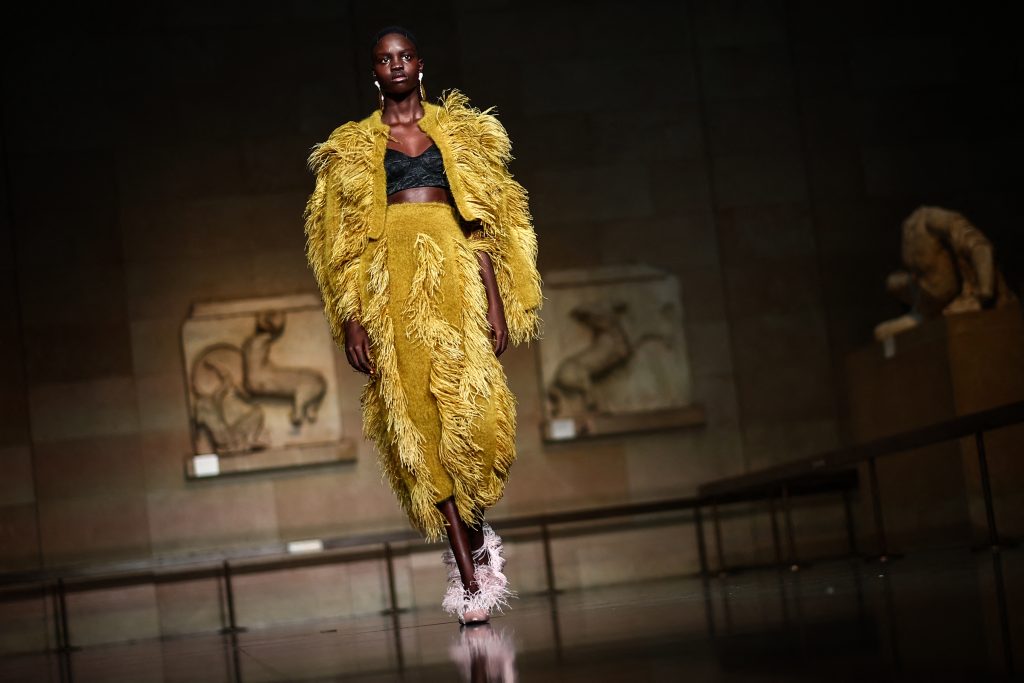Museums & Institutions
A Fashion Show in Front of the Parthenon Marbles Stirs Controversy
The uproar has been compared to a Dior fashion shoot at the Acropolis that was sanctioned by Greece for $750,000 in 2021.

The uproar has been compared to a Dior fashion shoot at the Acropolis that was sanctioned by Greece for $750,000 in 2021.

Jo Lawson-Tancred

Greece’s culture minister Lina Mendoni has expressed outrage at the British Museum’s decision to allow a fashion show in front of the Parthenon Marbles. The British fashion label Erdem debuted its Autumn/Winter collection at London Fashion Week on Saturday, February 17, with a fleet of models strutting past the iconic and contested Greek sculptures, a display that Mendoni said showed “zero respect for the masterpieces of Pheidias.”
Designer Erdem Moralioglu apparently picked the location in homage to the American-Greek opera singer Maria Callas. In particular, he was inspired by her starring role in a 1953 production of Luigi Cherubini’s Medea, based on the Greek tragedy by Euripides.
“I wanted to show in this space that epitomized her Greekness,” he told Vogue.
“The directors of the British Museum trivialise and insult not only the monument but also the universal values that it transmits,” she said, according to The Telegraph. “The conditions of display and storage of the sculptures, at the Duveen Gallery, are constantly deteriorating. It is time for the stolen and abused sculptural masterpieces to shine in the Attic light.”
The British Museum has not publicly commented on Mendoni’s criticims but a spokesperson confirmed that the safety of collection is always considered when accepting commercial bookings for the space.
It has also been reported in the British press that, in 2021, Dior paid Greece around €700,000 ($750,000) to get permission to stage a fashion shoot at the Acropolis plus €200,000 ($215,000) in lost earnings for closing the site.
Mendoni told The Telegraph that the Dior clothes had at least been inspired by ancient Greece, which is not the case for Erdem’s latest collection.
“The Parthenon sculptures were merely decoration, since, thematically, the collection had no dialectical connection to Greek antiquity.” she said.
The U.K.’s ownership of the Parthenon Marbles has long been contested by Greece and negotiations to strike up some kind of loan deal have yet to come to fruition. Permanent repatriation is currently blocked by the U.K.’s British Museum Act of 1963 but the issue became particularly heated over the summer when it was revealed that the museum’s own Greek antiquities curator had been stealing from the collection and selling off ancient treasures on eBay. Some of the stolen gems that have since been recovered went on public display at the British Museum last week.
“The thefts by the responsible curators, but also the proud silence of the leaders who neither take care of their collections nor implement the appropriate security measures, prove that the ‘hospitality’ provided to the Parthenon marbles at the British Museum has always been flawed, incomplete, and problematic,” Mendoni told the Greek newspaper Ta Nea at the time.
A potential loan arrangement between the U.K. and Greece over the Parthenon Marbles could be realized, according to the British Museum’s interim director, Mark Jones, who told the UK newspaper the Times that he supports the plan in January.